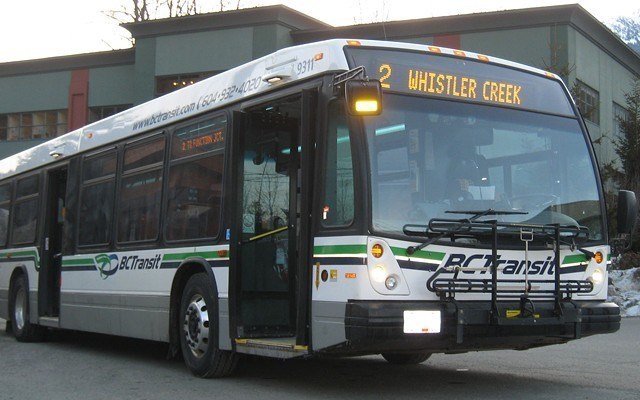Whistler transit users may pay a little more starting Oct. 1.
Following a comprehensive fare review led by BC Transit and municipal staff, Whistler council voted last month to receive a fare review report which could see an increase in transit fares for the first time since 2011 and phase out the 10-Ride Pass and 30-Day Concession Pass for students and seniors.
The changes are part of a broader push to improve cost recovery amid inflation, service expansions and growing operational demands. Most of council endorsed a staff-recommended option that raises the adult cash fare by 25 cents to $2.75, and increases the 30-Day Pass by $5 to $55.
Funding for the Whistler Transit System (WTS) is shared between the province (46.69 per cent) and the Resort Municipality of Whistler (53.31 per cent), with RMOW contributions supported through a mix of fare revenue, parking fees, hotel taxes, advertising and property tax.
“This is how we pay for our 31-bus system—approximately 86,000 hours of transit service,” said transportation demand management coordinator Emma DalSanto at the June 24 council meeting.
Historic fare context and rider habits
Transit in Whistler launched in the winter of 1991-92 with cash fares set at $1.25 and monthly passes priced at $50. The fare has only increased three times since then—in 1995, 2007 and 2011. A notable fare decrease occurred in 2017, when the 30-Day Pass was reduced from $65 to $50 to align with the cost of monthly parking in Day Lots 1 to 5.
That fare strategy was designed to support a broader transportation shift toward sustainable travel by making transit more competitive with vehicle use.
BC Transit estimates if fares had kept pace with inflation, the current adult cash fare would be $3.42.
What’s proposed
Under the new fare structure:
- Cash fares rise to $2.75 from $2.50.
- The 30-Day Adult Pass increases to $55 from $50.
- The 10-Ride Pass will be eliminated in favour of a new Umo DayPASS system that automatically caps fares after a second tap in one day.
- The 30-Day Concession Pass will also be eliminated, though six- and 12-month concession passes remain.
The decision to cut the 30-Day Concession Pass stems from Umo fare card data, which revealed an unusual spike in concession pass purchases. “Our community hasn’t changed, or suddenly gotten a ton more seniors and students,” DalSanto said, suggesting some customers were self-identifying without verification.
Whistler students already ride for free through a separate program. The six-month and 12 month passes must be purchased at municipal hall, which ensures staff can verify buyers qualify.
Public feedback and equity concerns
The fare review included an online survey with 440 responses. Fewer than a third of respondents agreed passenger fares should increase to reduce the need for higher property taxes. Many respondents suggested parking revenues should play a larger role in transit funding.
Several residents also pointed out that a monthly parking pass for Day Lots 4 and 5 is cheaper than a 30-Day transit pass, which could incentivize driving.
Councillor Jessie Morden, the lone vote against receiving the fare report, voiced concern about affordability. “Wages aren’t going up, rent is going up, everything is going up,” she said. “Twenty-five cents, or $5 might not seem like a lot to us—but people are telling us different.”
New pass options in the works
Staff are working with BC Transit to introduce new fare products tailored to Whistler’s needs. These include:
- A ProPASS and EcoPASS, which would allow employers to offer discounted transit passes to staff through payroll deduction.
- A Multi-User DayPASS, enabling groups of up to four people to ride using one Umo account—ideal for visiting families.
- A Pemberton-Whistler Multi-System Pass to address a gap left by the elimination of the Pemberton-Commuter Top-Up when Umo was introduced in June 2024.
The proposed Multi-User DayPASS would be priced at the cost of three individual passes plus $1.
Implementation timeline
BC Transit requires six weeks to implement any fare changes. Staff recommended Oct. 1 to align the increase with the lead-up to winter service changes. Council is expected to formally endorse the new Annual Operating Agreement (AOA) with BC Transit on July 22.
If approved, the updated fares will be included in the 2025/26 AOA.




